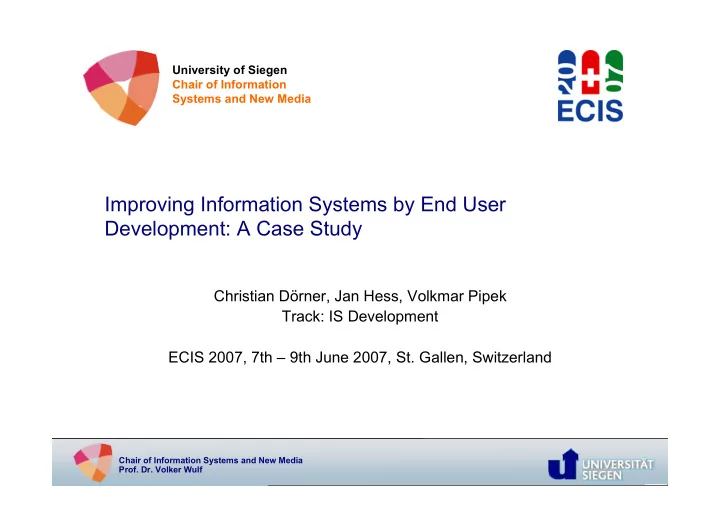

University of Siegen Chair of Information Systems and New Media Improving Information Systems by End User Development: A Case Study Christian Dörner, Jan Hess, Volkmar Pipek Track: IS Development ECIS 2007, 7th – 9th June 2007, St. Gallen, Switzerland Chair of Information Systems and New Media Prof. Dr. Volker Wulf
Introduction Non-professional software developers Users’ contribution to End users Do customizations Case study customization Domain experts Design of flexible Create/adapt software artifacts software Less communication problems Techniques End User Faster adaptation End user Development Set of Methods processes adaptations Decreased Tools maintenance costs Non-professional software developers Chair of Information Systems and New Media Prof. Dr. Volker Wulf 2 ECIS 2007, 7 th – 9 th June 2007, St. Gallen, Switzerland
Background The case study was done within the EUDISMES 1 project Project aim: Development of innovative EUD techniques for the business software market Focus on SME , because they have a very limited amount of human and financial resources Our project partners are: 1 End User Development In Small and Medium-Sized Enterprise Software Systems Chair of Information Systems and New Media Prof. Dr. Volker Wulf 3 ECIS 2007, 7 th – 9 th June 2007, St. Gallen, Switzerland
Research Questions What problems do users experience in their daily work? Which systems are affected? How serious are these problems? Are there other users in the organization who have similar problems? How do users try to solve the problems ? How do they create solutions? Which tools do they use for the solution? Which people are involved in the solution process? Chair of Information Systems and New Media Prof. Dr. Volker Wulf 4 ECIS 2007, 7 th – 9 th June 2007, St. Gallen, Switzerland
Research Methodology Qualitative Research: Semi-structured interviews Allows a very detailed and profound insight into the working field Topics could be addressed in detail , because users could tell stories and describe their working processes Participants : different kinds of employees First phase : Identification of Knowledge organizational structures Second phase : Existing problems and Participants: CEOs and suitable solutions managers from IT departments Spring 2006 Summer 2006 Chair of Information Systems and New Media Prof. Dr. Volker Wulf 5 ECIS 2007, 7 th – 9 th June 2007, St. Gallen, Switzerland
Interview Setting Interviews conducted at companies’ sites Participating companies 2 small SME , running industry-specific, ERP-like systems and MS Office 3 lager SME , running SAP R/3 as ERP system and MS Office Examples for interview questions : Does the software meet your requirements? What do you do, if you experience problems during software usage? Interview Phase # of Interviewees Duration One 7 80 to 120 min. Two 18 45 to 90 min. Chair of Information Systems and New Media Prof. Dr. Volker Wulf 6 ECIS 2007, 7 th – 9 th June 2007, St. Gallen, Switzerland
Results Focus: Two important categories for the design of user adaptable IS Analysis of problem types Showed a variety of end users’ problems with software Highlighted that there are users with similar problems Allows IS designers to choose appropriate EUD techniques, to address the problems Analysis of problem solving strategies Showed, how EUD works nowadays Describes, how users try to solve problems together Highlights, how many and what kind of people are involved in the process Allows IS designers to choose useful support mechanisms Chair of Information Systems and New Media Prof. Dr. Volker Wulf 7 ECIS 2007, 7 th – 9 th June 2007, St. Gallen, Switzerland
Results – Case I Karen (manager of accounts department) Create credit limit check Data is stored within different SAP modules Problem: Collection of Data is complex Formatting in Excel is nicer Solution of problem was not successful Functional Problem: Inappropriate function Chair of Information Systems and New Media Prof. Dr. Volker Wulf 8 ECIS 2007, 7 th – 9 th June 2007, St. Gallen, Switzerland
Results – Case I Small problems are discussed with colleagues In this case, she asked IT Consultants are very expensive, contact is established via phone or email Creation of a proper solution with IT was possible Implications Support of cooperative adaptations EUD tools could improve process Chair of Information Systems and New Media Prof. Dr. Volker Wulf 9 ECIS 2007, 7 th – 9 th June 2007, St. Gallen, Switzerland
Results Margaret (employee of order management) Has to create production list twice a week First, create a list with all data List has to be exported to Excel List has to be processed with a Pivot table Problem: Process takes approximately one hour Functional Problem: Missing functionality Chair of Information Systems and New Media Prof. Dr. Volker Wulf 10 ECIS 2007, 7 th – 9 th June 2007, St. Gallen, Switzerland
Results Process is inefficient Other SAP Key Users could not help to improve it Neither IT Contacted consultant via telephone (problem is too small for a visit) Implications Programs should provide EUD mechanisms Support of cooperative adaptations Chair of Information Systems and New Media Prof. Dr. Volker Wulf 11 ECIS 2007, 7 th – 9 th June 2007, St. Gallen, Switzerland
Summary The design of flexible software is still an issue We discovered detailed information about users’ problems and problem solving processes EUD takes already place, but could be improved by tools The derived implications should be considered in the design process The study complements existing ERP studies by illustrating activities and practices of users Further research activities Results will guide our development of EUD tools The implications will be proved in practice in the future by an evaluation of our prototypes Chair of Information Systems and New Media Prof. Dr. Volker Wulf 12 ECIS 2007, 7 th – 9 th June 2007, St. Gallen, Switzerland
Contact Christian Dörner University of Siegen Tel.: +49 - 271 740 40 70 E-Mail: christian.doerner(at)uni-siegen.de http://www.eudismes.de Chair of Information Systems and New Media Prof. Dr. Volker Wulf 13 ECIS 2007, 7 th – 9 th June 2007, St. Gallen, Switzerland
Recommend
More recommend